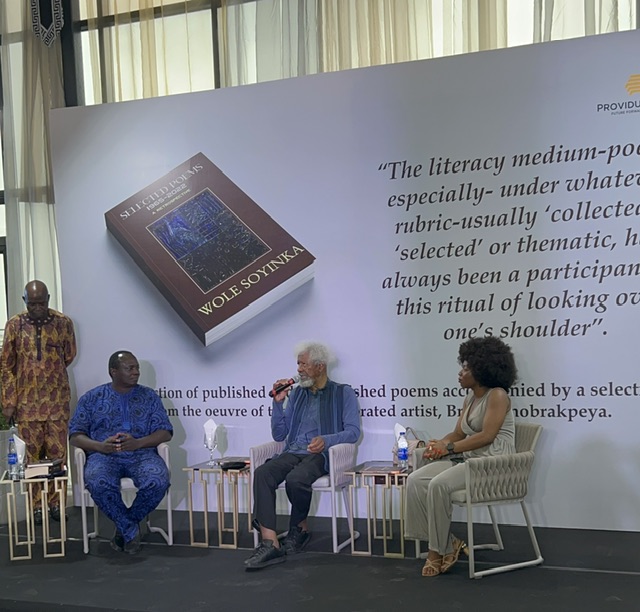
An evening with WS
By Femi Olugbile
The proceedings were well along the way by the time you reached the venue, on the sixth floor of the ritzy Providus Bank corporate headquarters on Adeola Odeku Street, in Victoria Island. The ample meeting room was already full.
Wole Soyinka, the grand old man of Nigerian Literature, sat on a slightly elevated platform, flanked by his interlocutors. Tade, on the right, was an award-winning poet. Juliet was a young female poet, and the one to whom WS would regularly turn at various points in his delivery, as if to emphasize that he saw his remaining assignment as the facilitation of a generational succession in Literature, and in all the Arts.
‘Your generation will have to do this…You people will have to pay attention to this…’ he intoned, from moment to moment.
He had turned 89 years old only a few days ago. The event was to honour him, and to take in a reading from his latest work – an anthology of old works titled ‘Selected Poems 1965-2022; A Retrospective’.
For many in the audience, made up of young and old, it was a chance to bask in the penumbra of greatness. He was the quintessential man of many parts – the poet, the ‘Lone Gunman’ who took down the gloating, celebratory broadcast of Ladoke Akintola after his electoral heist, and replaced it with a mocking, disdainful condemnation; Captain Blood of the Pyrates Confraternity; the man who crossed the battle line in the Nigerian Civil War, not just to speak to Odumegwu Ojukwu, as he would later explain, but to seek out Christopher Okigbo and his other friends in the writers confraternity and have a dialogue with them. For his pains, he was hauled into prison on his return from ‘Biafra’. He would remain in prison for most of the duration of the Civil War. His friend Okigbo would die, as would many people on both sides. After his release, the Nigerian military ruler, the young and eager-to-be-liked Yakubu Gowon, would send him the message – ‘No hard feelings’.
About Gowon, and his times, Soyinka would later write, famously ‘The Man Died’.
He was a writer who lived the Literature he wrote.
Juliet wanted to know if there was justification for literature to be complicated and hard for the general reader to access.
It was obviously a familiar ball for Soyinka to bat in his public interactions.
Riddles and parables were a common part of folklore in African culture, he replied. You had to think to fathom the story. He gave an example of a common Yoruba entrée that children learned and shared with their peers in the tales by moonlight ambience that was common in earlier times.
Tade took him up on his celebrated poem – ‘Abiku’. He had first read it as a child, and it had left an indelible impression on him. It bespoke a world of powerful metaphysical imagery and happenings beyond common comprehension. It still awed him, and he wanted the audience to partake of his awe. He summoned the writer and newspaper columnist Ogaga Ifowodo from the audience to recite the poem.
The host, the irrepressible Jahman Anikulapo, was not having any of that. It was not in the programme, and he shut it down.
Later, during audience participation, someone disclosed that those regarded in earlier times as ‘Abiku’ or ‘Ogbanje’ were really children with Sickle Cell Disease dying early because of lack of medical diagnosis and treatment. Did the newer insight supplied by Science take the shine off the mysticism conveyed in his Poetry?
Soyinka was adamant it did not. There was a place for Science in human affairs, and he was all for innovation and discovery. He followed even the most arcane developments in Astro-Science.
‘I get offended when any rocket is fired without my knowledge’ he quipped.
But there was a life beyond what was known.
‘Two plus two is not always four. It could be six.’
Tade led the talk to ‘Idanre’, one of his most remarkable early works. He was aware the poem had been written in one day after WS had gone on an all-night trek through the streets and bye-ways of Ibadan, a walk that would be dangerous due to kidnappers and sundry villains in the present day.
Soyinka disclosed that the idea of doing a ‘Retrospective’ on his works came to him in San Diego, USA while he was a guest at another ‘Retrospective’, a colloquium and exhibition of the works of the artist Bruce Onabrakpeya, to celebrate his 90th birthday. Bruce himself was in the audience here in the swank roof-top meeting room of Providus Bank, smiling quietly through the proceedings. There were several of his artworks interspersed with the poetry in Soyinka’s new book.
You ventured to ask WS what the writer’s attitude should be to the new Woke activism that dominated the public space in the Western world and ‘cancelled’ even famous writers who did not agree totally with their extreme ‘inclusions’ on gender identity and other issues.
The world was a big place, he responded. Big enough for all sorts of ideas and beliefs to exist side by side.
He was lean and rather frail-looking, and he was hard of hearing in one ear, it seemed. He was 89, going on 90. But his mind was keen as ever.
The grand dame of Nigerian thespians, Taiwo Ajayi-Lycett expounded on the difference between Artist and Artiste.
Soyinka rounded off, dedicating the evening to all the heroes and victims of his country – to the Chibok girls and others, to Gabriel Akaluka and other victims of religious extremists, to those who had been lynched and those who were still liable to be lynched, to the victims of kidnappers and all other casualties of the Nigerian condition.
He and his friend Bruce Onabrakpeya signed some books.
Oh, and there were tasty viands and wines on offer at the bar, courtesy of Providus Bank.
